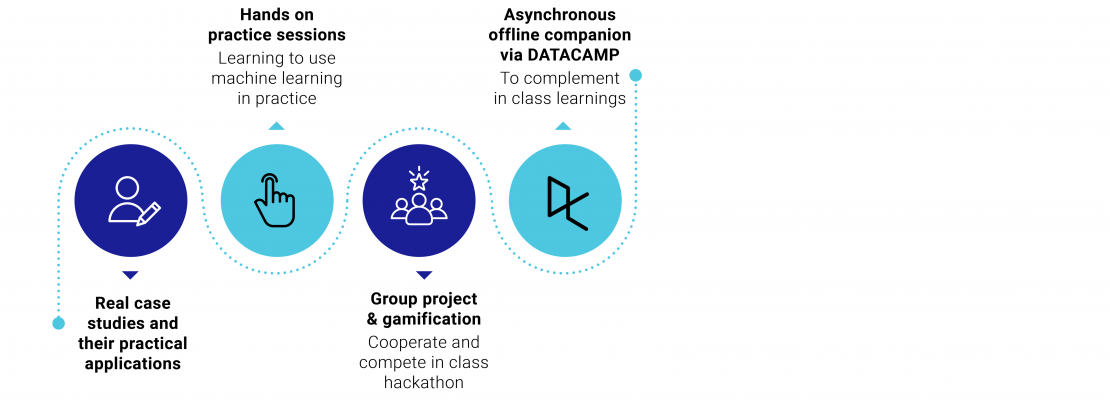Format:
Blended-Learning
This program provides an understanding of the latest approaches to prediction and classification with machine learning, as well as the theory and practice behind experiments and pilots as measurement tools in organizations. It aims to offer insights into the most recent advancements in technologies that enable the development of artificial intelligence systems, such as Chat-GPT or GEMINI, which can be applied and implemented in business contexts, having a direct impact on productivity and competitiveness.
The program offers practical experience through a case study that uses real-world data. The program consists of two curricular groups: the first curricular group focuses on predictive analysis through machine learning; the second curricular group introduces tools to design, implement, and evaluate experiments. Both curricular groups conclude with a group project to be developed using the methods and tools learned in the program.

This highly practical and hands-on program is designed for executives, regardless of their academic background, who are interested in exploring the functionalities of data analysis and machine learning technologies applied to management and decision-making in business. It aims to provide the participants with a technical overview of the latest artificial intelligence and causal modelling tools.
The program prepares participants for a new professional profile emerging in European companies as a result of the implementation of the EU AI Act, such as “Chief AI Officer (CAIO)” or “Head of AI.” These emerging profiles will be responsible for the implementation, development, and management of Artificial Intelligence in companies and public organizations.
The in-person sessions will take place in a cloud infrastructure specially configured by the CATÓLICA-LISBON faculty. To maximize your experience, it will be necessary to install R and Python environments on your computer. We will provide support for software setup during the first sessions of the program.
Apply the latest data analysis theories, including forecasting and causal inference methods to business analytics problems.
Use a statistical programming language (R/Python) to deploy machine learning and causal modeling methods in business-relevant problems.
Understand how to design and implement field experiments to measure the impact of business changes on relevant outcome metrics.
Discover the learning modules and unlock your full potential.
Module |
Duration |
| WELCOME | START TO CONNECT | SOFTWARE SETUP | OVERVIEW | 4h |
| INTRODUCTION TO UNSUPERVISED LEARNING | 3h |
| INTRODUCTION TO SUPERVISED LEARNING | 3h |
| MODEL EVALUATION | 3h |
| MACHINE LEARNING MODELS | 6h |
| ADVANCED TOPICS | 3h |
| IN-CLASS PREDICTION CASE STUDY + LUNCH & NETWORKING | 7h |

IN-CLASS EXPERIMENT ANALYSIS + LUNCH & CELEBRATING OUR PATH
7 horas

The program fee is €3,350. Alumni of the Universidade Católica Portuguesa benefit from an exclusive 10% discount.
It includes:
The program fee can be paid in full at the beginning of the program or, in the case of individuals, it can be paid montlhy (with no extra cost).
Universidade Católica Portuguesa is exempt from VAT.
CATÓLICA-LISBON signed a cooperation protocol with Caixa Geral de Depósitos which provides special enrolment conditions for Executive Education participants. If you are interested, please check the funding conditions offered by this banking institution.
The program is eligible for individual funding (up to €750) through the Government Measure: Cheque Formação + Digital, promoted by IEFP. More information: here.